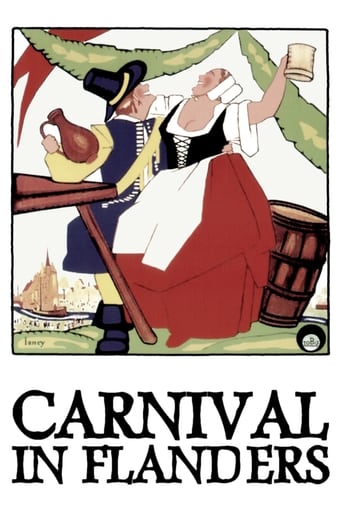Robert J. Maxwell
It's the Flemish town of Boom in the 17th century and the conquering Spanish army is going to spend the night in the village, preceded by rumors of pillaging, barbarity, rapine, torture, infanticide, and smoking in public.The men of the town are mostly plump burghers and they're terrified. The women, led by the Burgomaster's wife (Rosay), decide that instead of being sullen and acting scared they'll welcome the Spaniards and perhaps mollify them by being accommodating. It works.The first impression a view is likely to get is that this is some sort of animated cartoon full of elaborately (and sometimes definitely weirdly) costumed men and women dashing around excitedly and shouting at one another in French.My impression didn't change all that much, though I waited patiently for something more outrageous than a stout man rolling helplessly down a flight of stairs -- we can get that in Laurel and Hardy -- and a suggestion of cuckolding.The costumes arrest the attention. They're absurd and they're dwelled on too. Rips are sewn up and women worry whether their mourning clothes are still in fashion. The Spanish lieutenant is gay and given to needlepoint or whatever it is -- and he knows all about it. There's a dwarf who loves his two pet monkeys and has to sit on a few volumes of Erasmus ("A pain in the a**") in order to reach the dinner table. There is a priest who extorts money from the dwarf and accepts gifts by passing out indulgences, which are absolution for sins yet to be committed. The priest gets drunk. There is a painter, Jan Breughel the younger, whose work is now valuable but considered imitative -- as one of the Spaniards remarks.All in all, everybody sings and dances and has a good old time except the men of the village, who are mostly in hiding, less those who run the inn and are making scads of dough. Oh, and the viewer's enjoyment is moderate, like that of the only sober person at the party.
dbdumonteil
"La Kermesse Heroique" is looked upon,in France ,as Jacques Feyder's apex as well as the beginning of his decline .This is a colorful entertaining work,with wonderful settings ,costumes,actors ,folk songs and scenes inspired by the Flemish art (the mayoress' daughter is in love with a painter ,Jean Brueghel.) The director's wife,Françoise Rosay (who was also featured in the two previous works "Le Grand Jeu" and "Pension Mimosas " and would be the star of the next work "Les Gens Du Voyage" ) finds here the role of a lifetime : the mayoress character was probably inspired by the strong wives or servants we find in Molière's plays (Madame Jourdain,Toinette).Rosay has the first part of the movie for herself ,but she shares the acting honors with Louis Jouvet's mischievous part of the chaplain;an opportunity for Spaak to laugh at religion;during the banquet ,the nice innocent young ladies ask the ecclesiastic to tell them a tale of the Holy Office :the clergyman tells them the tale of a virgin whose body was covered with honey and licked by a he-goat,the guests have a wonderful time!And when the holy man ,leaving the town,is given chocolate by an inhabitant:he smiled, he thanks and gives her ,as a bonus, some indulgences!I hope she was not protestant.In this Flemish town,where people are gathering for the fair ,men are cowards :as soon the coming of the Spaniards is announced,they hide their money ("superior significance women cannot understand" ),or they pretend that they are dead (the mayor).A false flash-forward depicts the cruelty of the invaders.Not only the occupying forces treat the woman as ladies ,but they show romanticism - the mayoress dreaming of Italy, the chaplain marrying "Romeo" to "Juliet" - and a sense of humor -the duke has obviously guessed that the mayoress is not a widow.Today,Feyder is eclipsed by Renoir ,Carné -who was here his assistant again ,after "Pension Mimosas" - or Duvivier;he seems to enjoy a good reputation abroad though;"Kermesse" and the two other works I mention above are essential viewing for anyone interested in the French cinema.
spompermayer
"Carnival in Flanders" This a clever, charming film that depicts the womenfolk of a Flemish village winning over Spanish invaders. The mayor's wife rallies the women to use all their power and resources to seduce the Spaniards--and it works! There are some very funny moments involving the vigil for the "deceased" mayor (especially when the court midget blackmails him). Most films about the 17th Century are pretty stodgy, but "Carnival" is delight.I recommend this film.
writers_reign
After sixty years what is still most striking about this film are the evocations of Flemish Art from the opening scene in a market place crowded with Brueghel figurines to the subsequent groupings of the good burghers of Boom in the style of Rembrandt and the Rubenesque womenfolk. Charles Spaak turned in his usual reliable script and Jacques Feyder filmed it more than competently with his wife, Francoise Rosay in a key role. Louis Jouvet is the class act, not unusually but the plot is a little creaky - it failed as a Musical on Broadway in the early fifties where it played under the title Carnival In Flanders and left in its wake an enduring standard 'Here's That Rainy Day'. Certainly worth another look.



